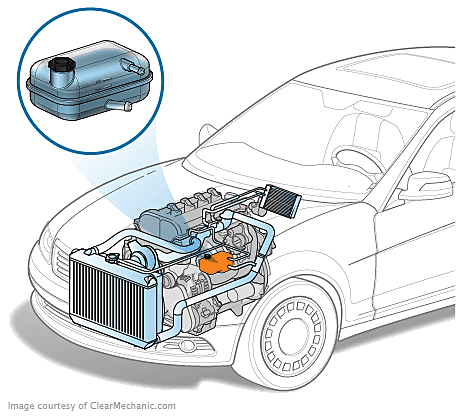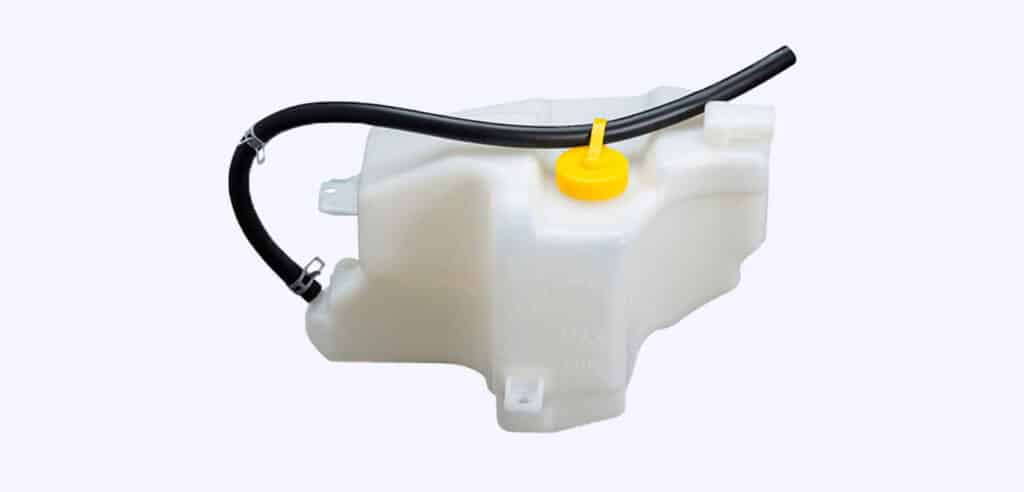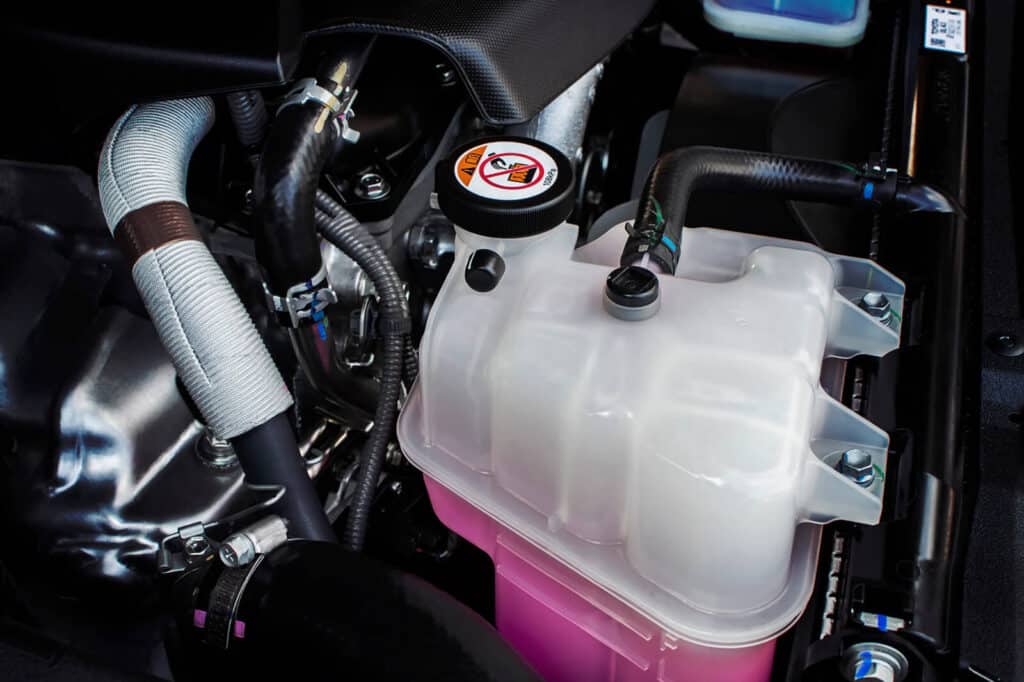Introduction
Does your car’s engine seem hotter than usual? Could your radiator reservoir be the culprit? Here’s a handy guide to help you understand what a radiator reservoir is, how to spot a faulty one, and what to do if you need a replacement.
What is a Radiator Reservoir?
Your vehicle’s radiator reservoir, also known as a coolant reservoir or overflow tank, is a vital part of the cooling system. It holds the coolant that overflows from the radiator and keeps it under pressure. The reservoir ensures that the radiator has an ample supply of coolant and prevents overheating.
How Much Will it Cost to Replace a Radiator Reservoir in Canada?
On average, replacing a radiator reservoir in Canada can cost between $100 to $250, depending on the make and model of your vehicle. This price includes both parts and labour, with labour accounting for about $50 to $100 of the total. The replacement process usually takes about an hour to an hour and a half.

What are the Symptoms of a Faulty Radiator Reservoir?
The symptoms of a faulty radiator reservoir can include the following:
• Overheating Engine: If the reservoir cannot properly hold coolant or maintain system pressure, the engine may overheat.
• Coolant Leaks: If the reservoir is cracked or damaged, you may notice coolant leaking from the area of the reservoir.
• Low Coolant Warning Light: Many vehicles have a warning light that will illuminate if the coolant level is low. If the reservoir cannot properly hold the coolant, this light may come on.
• Fluctuating Coolant Levels: You may notice that the coolant level in the reservoir fluctuates wildly, going from full to empty without any apparent reason. This could indicate a crack in the reservoir or a problem with the system’s pressure.
• Visible Damage to the Reservoir: Cracks, warping, or other visible damage to the reservoir can be signs of a problem. You might also see signs of previous coolant leaks, such as dried coolant residue.
• Coolant Smell: If the reservoir is leaking, you may notice a sweet, somewhat sharp smell, which is typical of engine coolant.
How Long Does a Radiator Reservoir Last?
A radiator reservoir is designed to last the lifetime of the vehicle. However, it can become defective prematurely due to factors such as harsh driving conditions, extreme temperature changes, or poor maintenance.
How Does a Radiator Reservoir Become Defective?
A radiator reservoir, also known as a coolant reservoir or overflow tank, can become defective due to a variety of factors:
• Age and Wear: Over time, the plastic of the reservoir can become brittle due to constant exposure to hot coolant and engine heat. This can cause the reservoir to crack or develop leaks.
• Heat and Pressure: The constant heat and pressure from the cooling system can cause the reservoir to warp or deform, which can lead to leaks.
• Physical Damage: Accidents, debris from the road, or even improper handling during maintenance can cause physical damage to the reservoir, leading to leaks or a decrease in its structural integrity.

• Faulty or Worn Out Cap: The cap on the reservoir is designed to maintain a certain pressure within the cooling system. If this cap becomes worn out or defective, it may not hold pressure properly, which could cause the reservoir to fail.
• Poor Quality or Incorrect Coolant: Using a poor quality coolant, or one that is not recommended for your specific vehicle, can cause damage to the entire cooling system, including the reservoir. Certain types of coolant can cause corrosion or buildup in the system, leading to failures.
• Clogged Cooling System: If the cooling system is clogged with rust or scale, it can cause the coolant to back up into the reservoir, potentially causing it to overflow or crack under the pressure.
How Can a Faulty Radiator Reservoir Affect Other Systems in the Car?
• Overheating Engine: The main function of the radiator reservoir is to provide extra coolant to the radiator when needed. If the reservoir is faulty, it can lead to a low coolant level, potentially causing the engine to overheat. This can cause severe damage to the engine and its components.
• Damage to Cooling System: A faulty radiator reservoir may not necessarily cause issues in other systems directly, but it could indicate problems within the cooling system itself. This can cause undue wear and tear on various components of the cooling system, such as the water pump, radiator, and hoses.
• Potential Transmission Damage: In some vehicles, the cooling system also cools the transmission fluid. Therefore, if the cooling system isn’t working properly due to a faulty radiator reservoir, it could potentially lead to transmission issues.
• Erratic Temperature Gauge Readings: If the radiator reservoir is faulty, causing inconsistent coolant levels, this could lead to erratic readings on your vehicle’s temperature gauge, making it hard to know the actual state of the engine’s temperature.
• Reduced AC Efficiency: A compromised cooling system, due to a faulty radiator reservoir, can sometimes affect the efficiency of the car’s air conditioning system, as both systems work in conjunction to remove heat from the vehicle.
Is it Safe to Drive with a Faulty Radiator Reservoir?
Driving with a faulty radiator reservoir can present a series of potential issues, primarily due to the risk of your car’s engine overheating. This is because the radiator reservoir, also known as the coolant overflow tank, holds excess coolant for the radiator. It acts as a buffer, ensuring that the radiator never runs low on coolant as the engine heats up and cools down. If the reservoir has a leak, cracks, or other faults, it can cause the coolant levels in the radiator to drop below an optimal level, which could lead to overheating.
Moreover, operating your vehicle with a faulty radiator reservoir could also mask other potential issues. The reservoir can act as an indicator of the health of your cooling system; frequent need for coolant top-ups may point to a leak in the system or problems with the radiator cap. If the reservoir is faulty, these problems could go unnoticed, potentially leading to more serious engine damage down the line. As such, while you might be able to drive with a faulty radiator reservoir in the short term, it’s definitely not safe or advisable for extended periods. Prompt diagnosis and repair are key to maintaining the health of your vehicle.

How Can I Make My Radiator Reservoir Last Longer?
To extend the lifespan of your radiator reservoir, follow these tips:
• Regularly check the coolant level: Ensure it’s within the recommended range.
• Use high-quality coolant: This can prevent corrosion.
• Regular inspections: Look for signs of physical damage or coolant leaks.
• Clean the reservoir: Over time, debris can accumulate and cause blockages. Regular cleaning can prevent this.
Can a Mobile Mechanic Replace a Radiator Reservoir?
Yes, a mobile mechanic can replace a radiator reservoir. They can come to your location, making it a convenient option for those with a busy schedule.
Conclusion: Radiator Reservoir Replacement
While a radiator reservoir is designed to last, problems can arise due to various factors. Regular maintenance and prompt attention to any issues can prevent further damage and extend the lifespan of your vehicle. Remember, your car’s health is crucial for your safety on the road. Be proactive, and don’t hesitate to seek professional help when needed.
Next Steps
Book Your Radiator Reservoir Replacement Service
The service most frequently booked by those who read this article is Radiator Reservoir Replacement. Uchanics’ expert technicians make the process even more convenient by bringing the service right to your doorstep. We perform this job at your home or office, covering over 40 cities in Ontario, including Toronto, Mississauga, Brampton, Oshawa, Ajax, Scarborough, and more. Our commitment to excellence has earned us more than 700 glowing 5-star reviews. Choose Uchanics for your Radiator Reservoir Replacement and experience unparalleled convenience and top-quality service.
